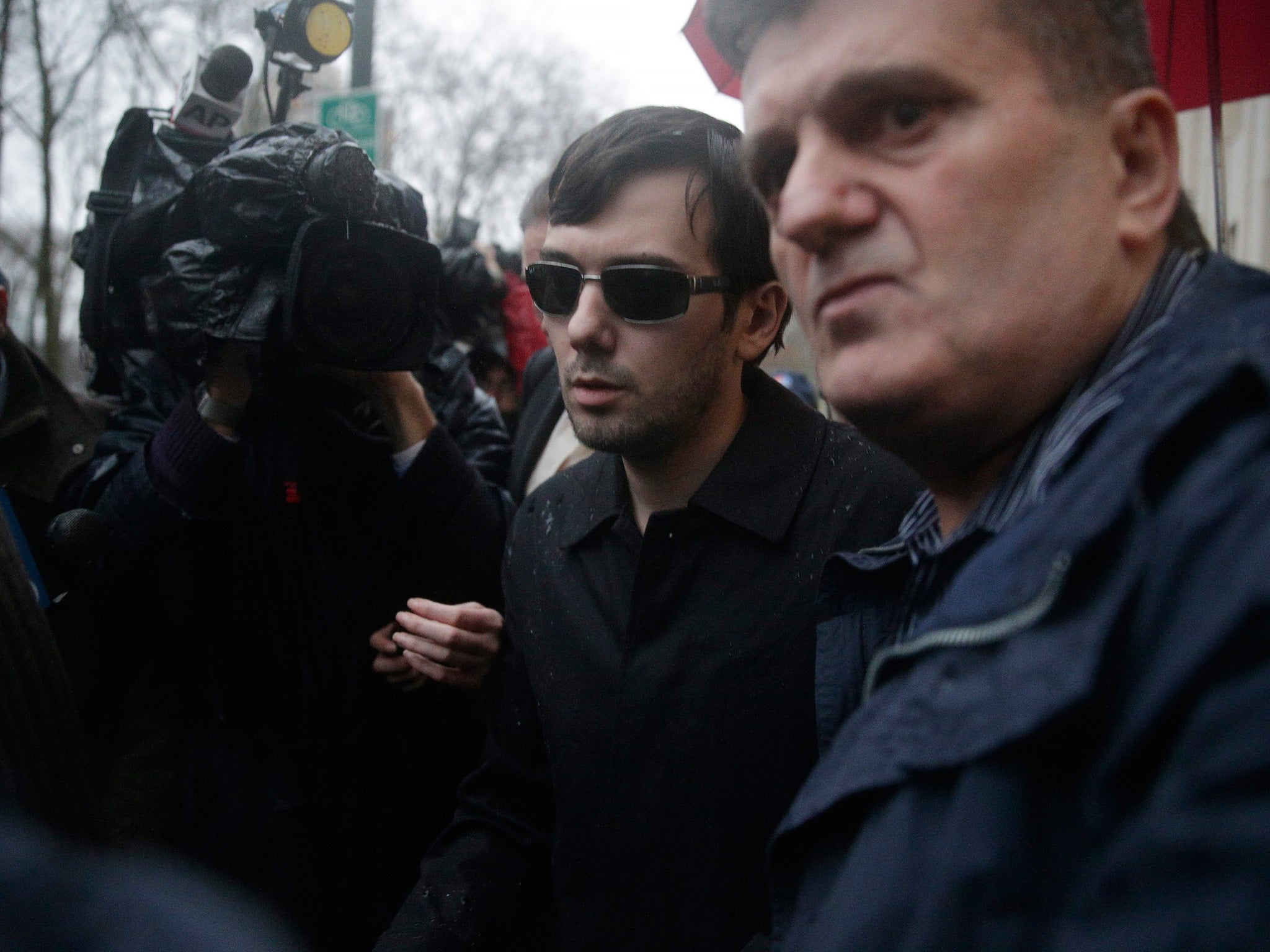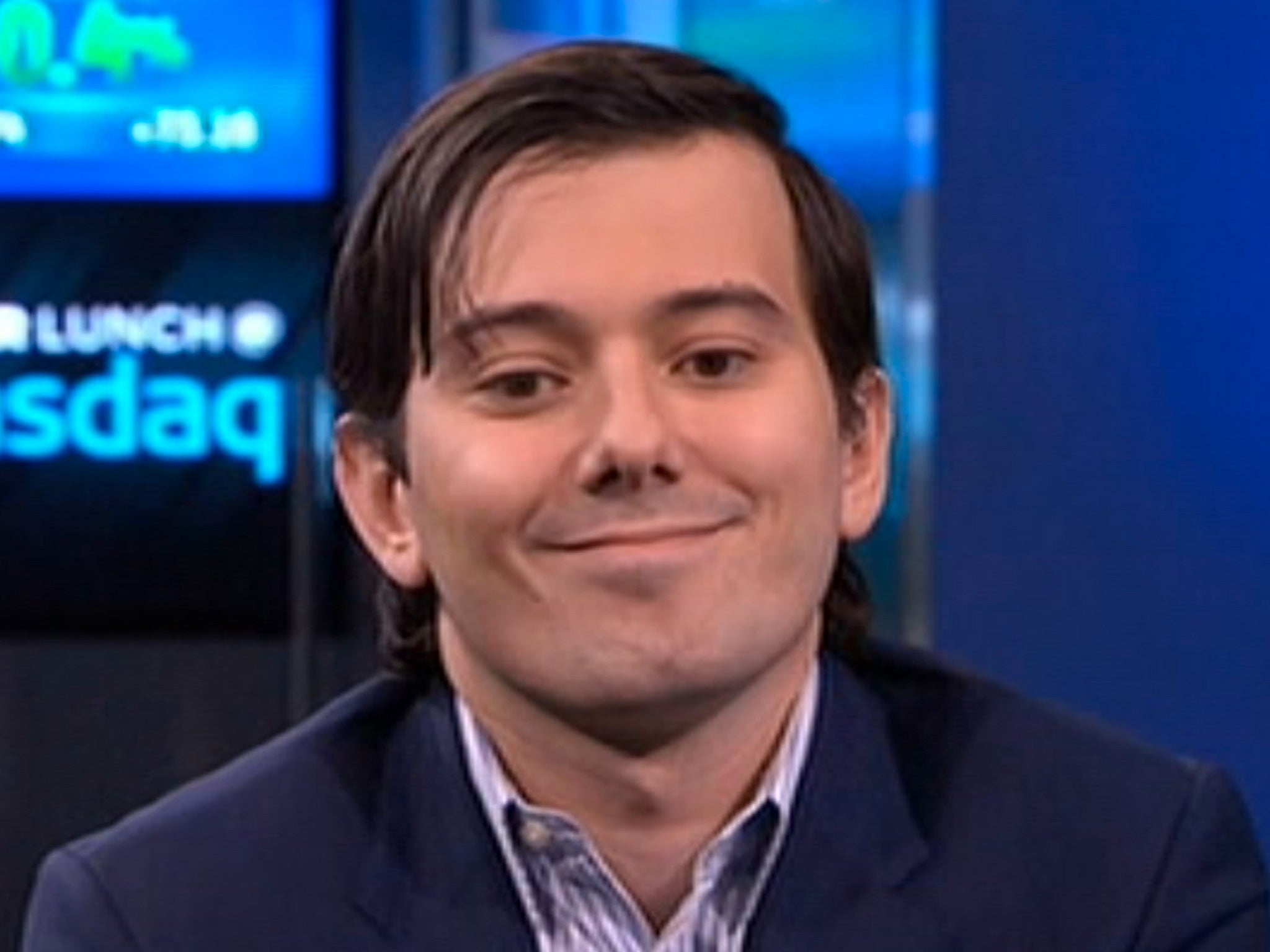Martin Shkreli refuses to testify at congressional hearing and calls lawmakers ‘imbeciles’
'Hard to accept that these imbeciles represent the people in our government'

Your support helps us to tell the story
From reproductive rights to climate change to Big Tech, The Independent is on the ground when the story is developing. Whether it's investigating the financials of Elon Musk's pro-Trump PAC or producing our latest documentary, 'The A Word', which shines a light on the American women fighting for reproductive rights, we know how important it is to parse out the facts from the messaging.
At such a critical moment in US history, we need reporters on the ground. Your donation allows us to keep sending journalists to speak to both sides of the story.
The Independent is trusted by Americans across the entire political spectrum. And unlike many other quality news outlets, we choose not to lock Americans out of our reporting and analysis with paywalls. We believe quality journalism should be available to everyone, paid for by those who can afford it.
Your support makes all the difference.Martin Shkreli has left the building.
Shkreli, the former chief executive of Turing Pharmaceuticals, who gained celebrity for jacking up a little-known drug's price, was excused from a House hearing on drug prices after he refused to answer any questions — other than how to pronounce his name correctly, or to confirm that, yes, he was listening.
After minutes of refusal to answer questions, during which Shkreli fidgeted, looked away, and appeared to smirk at times, he gave his parting remarks on Twitter:
Five minutes were set aside for opening remarks that could shed light on Shkreli's controversial decision to raise the price of Daraprim, a drug for a rare, but severe infection that afflicts people with compromised immune systems. But Shkreli declined to make any. Instead, Rep. Jason Chaffetz (R-Utah), chairman of the House Committee on Oversight and Government Reform, began asking him questions about patients affected by the price and remarks he had made previously. Shkreli gave the same composed answer to each question:
“On the advice of counsel, I invoke my Fifth Amendment privilege against self-incrimination and respectfully decline to answer your question,” Shkreli said. Repeatedly.
Shkreli didn't come willingly to Thursday's hearing. He was compelled by a subpoena that he threatened to ignore and that his lawyers argued against vehemently.
Wearing a slim black jacket, Shkreli sat at the end of a row of witnesses called before the committee with hands folded, fidgeting a bit and smirking at times — tics his attorney, Benjamin Brafman, called the “nervous energy” of the 32-year-old former hedge fund manager, not meant to show disrespect to any member of Congress.
Rep. Elijah Cummings (D-Md.) described Turing as a “Ponzi scheme” in his opening remarks, saying the research and development that Turing has claimed it is doing to justify its high prices is simply research on which new drugs it could acquire and raise the prices.
Shkreli smirked.

“It's not funny, Mr. Shkreli, people are dying,” Cummings said.
One of the few questions he did answer, asked by Rep. Trey Gowdy (R-S.C.), was whether he had pronounced his last name correctly.
When Gowdy told Shkreli he could answer questions without incriminating himself, since they would not bear on the securities fraud charges being brought against him in a separate matter, he said, “I intend to follow the advice of my counsel, not yours.”
Eventually, Shkreli was excused, trailed by a media scrum.
The hearing is focused on two companies that drove up the price of drugs they didn't invent and after Shkreli's departure, the rest of the witnesses testified. In addition to Shkreli, Turing's current chief commercial officer, Nancy Retzlaff, testified. Howard Schiller, the interim chief executive of Valeant Pharmaceuticals International, another company that has been accused of operating more like a hedge fund than a drug company, appeared. Janet Woodcock, the director of the Center for Drug Evaluation and Research at the Food and Drug Administration, and Mark Merritt, the president of the Pharmaceutical Care Management Association, a trade group that represents pharmacy benefit companies, was also present.
Turing and Valeant both turned over tens of thousands of pages of documents. Some highlights were presented in two memos released earlier this week. Although there are fascinating details taken from internal emails that draw back the curtain on the tactics of drug pricing, the main finding thus far is simple: Both the companies strove to maximise profits.
There are still thousands of pages of documents for the committee to mine for clues about how to prevent a practice that has been called “price gouging.” But at least so far, the evidence appears to echo the revelations of a previous Senate investigation of an $84,000 hepatitis C drug. That company, Gilead, also sought to maximise profits, even as its price affected patients' access to the drug.
High drug prices hit a nerve with the public and with politicians, but so far, congressional hearings have generated lots of buzz and few solutions.
Copyright: Washington Post
Join our commenting forum
Join thought-provoking conversations, follow other Independent readers and see their replies
Comments